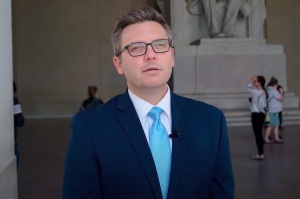Former Prime Minister: N. Koreans Affected by Rights Abuse More than Nuclear Threat
WASHINGTON – The North Korea nuclear issue was set aside and replaced by human rights concern during a congressional roundtable discussion on Monday.
Participants in the briefing, including former prime minister of Norway the Honorable Kjell Magne Bondevik, conferred about the need for the U.N. Security Council to address the human rights issue alongside current nuclear talks with North Korea.
Bondevik emphasized that millions of North Koreans are dying of starvation and in political prison camps as a result of human rights violations.
“I think we should be aware that what is affecting the people of North Korea in their daily lives is not the nuclear issue – of course it is affecting the security and stability of the country – but what is affecting them in their daily lives is the abuses to human rights,” said Bondevik, who represented a recent report entitled Failure to Protect: A Call for the U.N. Security Council to Act in North Korea at the briefing.
The report was commissioned by Bondevik, who established the Oslo Center for Peace and Human Rights, along with the Honorable Vaclav Havel, former president of the Czech Republic, and Nobel Peace Prize Laureate Elie Wiesel.
Bondevik made reference to the World Food Program’s (WFP) report last year on starvation as an example of human rights violation by the North Korean government.
Mike Huggins, WFP spokesman, reported that North Koreans would face “real hardship” this winter as a result of decreased foreign food aid as a result of the government’s test firing of several missiles last summer.
WFP also informed that 37 percent of children under six are chronically malnourished in North Korea and one-third of North Korean women are anemic and malnourished.
The country’s ruler Kim Jong Il is accused of diverting what food aid the country does receive to feed his army rather than its intended recipients – the North Korean people.
Felice D. Gaer, chair of the United States Commission on International Religious Freedom, agreed with Bondevik that current nuclear talks on economic assistance and diplomatic relations should be tied with increased freedom for North Koreans.
“Refugees, famine, and the violent repression of religious belief and practice are transnational and human rights problems that will continue to destabilize the Korean peninsula,” commented Gaer in a statement on Tuesday.
“That is why the human rights and humanitarian crises in North Korea deserve to be treated on a parallel track with security issues involving weapons of mass destruction and should not be marginalized,” said Gaer.
North Koreans live in a closed society which bans freedom of speech, press, religion and assembly. The government officially promotes the personality cult centered on Kim Jong Il and his late father, Kim Il Sung.
Christian experts on North Korea have also weighed in on the debate about addressing human rights issues in nuclear talks.
Some have said that although theoretically they agree that human rights abuses should be resolved before giving aid to North Korea, they said that from a practical standpoint they believe North Koreans cannot wait until the human rights issue is solved before receiving aid.
Others, however, have criticized the agreement as rewarding North Korea for years of bad behavior.
The agreement made during the six-party talks in Beijing last month on North Korea’s nuclear program established that the North will receive aid equal to 50,000 tons of heavy fuel oil in exchange for shutting down its main nuclear reactor.
Suzanne Scholte, chairman of the North Korea Freedom Coalition, argues that the United States and the other countries involved in the talk have fallen into the traps of Kim Jong-Il.
The human rights leader said the agreement “ignores” the suffering of the North Korean people and “betrays” American values for an agreement which will “ultimately unravel.”
“We have helped this brutal regime to survive instead of pressing him to reform,” declared Scholte in February after the announcement of the agreement.
Recently, churches around the world were encouraged to communicate with their government on an ethical and theological basis to completely reject nuclear weapons by the World Council of Churches.
The former Norwegian prime minister emphasized that the international community have nothing to fear about pressing North Korea on human rights because last year Pyongyang fired several nuclear missiles even though there was no pressure on the human rights issue.
Bondevik said his report makes recommendations that the U.N. Security Council adopt non-punitive resolutions towards North Korea including urging the country to allow open access to humanitarian assistance and the U.N. Special Rapporteur on Human Rights, the release of political prisoners, and to continue engagement by the United Nations.




























